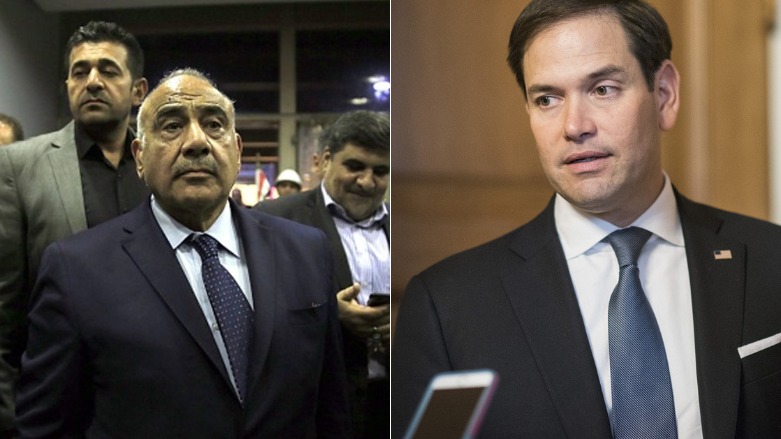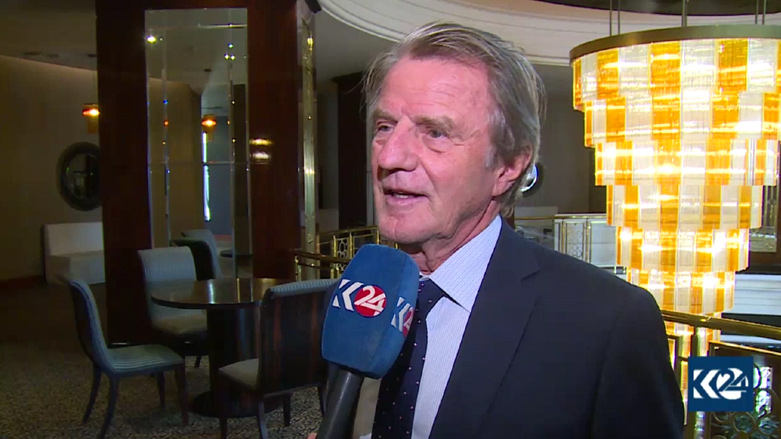Sen. Marco Rubio: new Iraq government is win for Iran

WASHINGTON DC (Kurdistan 24) – Sen. Marco Rubio (R, Florida) protested the notion that the formation of Iraq’s new government is a significant US victory. Rather, it is the opposite, as Rubio affirmed in a tweet on Wednesday: “The clear winner is Iran.”
Rubio’s tweet was directed at a Washington Post report that expressed satisfaction with Iraq’s new government after a Prime Minister and President were named on Tuesday, following nearly five months of political negotiations.
The Post affirmed there was “no clear winner in the ongoing tussle between Iran and the United States.” The Post’s message: once again, the US has succeeded in keeping Iraq out of the hands of Iran.
Rubio, a member of the Senate Foreign Affairs and Intelligence Committees, strongly disagreed, however. “This article is wrong in claiming that the selection of new Iraqi PM and President leaves no clear winner between #Iran and US.”
Qasim Soleimani, head of the Quds Force of Iran’s Islamic Revolutionary Guard Corps, “personally brokered this deal,” Rubio wrote, criticizing it as “a major & troubling development.”
Indeed, Michael Pregent, a Hudson Institute scholar, who served as an adviser to Generals David Petraeus and Raymond Odierno during Operation Iraqi Freedom (OIF), outlined pretty much this division of views on Wednesday.
Speaking at a Hudson Institute seminar, Pregent explained that a new narrative had appeared in Washington.
“All is well in Iraq—again,” Pregent said, summarizing the new line. “We have a Sunni speaker of the [Council of Representatives.] We have a moderate Shia prime minister, and we have a Kurdish president.”
The Post report embodied that new narrative, going so far as to suggest, “sectarian loyalties” in Iraq “are breaking down, giving way to more pragmatic coalitions that cut across sectarian lines.”
What could be wrong?
Iraq’s major political players are pro-Iranian, or they are unable or unwilling to push back against the strong, pro-Iranian current in Baghdad, Pregent explained.
The new “Speaker of the House is a pro-Iranian Sunni who has taken a position that Iraq will not honor sanctions against Iran,” Pregent stated.
That is what Mohammed al-Halbousi said shortly after being named Speaker. And he was supported in gaining his position by the pro-Iranian coalition, which placed second in the elections, and which now calls itself “al-Bina” (construction.)
Indeed, one member of that coalition, Qais al-Khazali, head of Asa’ib Ahl al-Haq (AAH), recently spoke with al-Monitor.
Backed by Iran, Khazali was involved in attacking coalition troops during OIF and imprisoned for three years, before being released in exchange for a British hostage.
The House Foreign Affairs Committee recently voted to sanction AAH as a terrorist group, although the bill’s fate is uncertain as US bureaucracies, aware of the vulnerability of their personnel in Iraq, hesitate to confront such groups.
Thus, as Khazali, whom the US arguably should have designated a terrorist long ago, told al-Monitor, “Halbousi is the candidate of the al-Bina coalition, and all our votes were given to him.”
The new Prime Minister, Adil Abdul-Mahdi, a Shia, was formerly an Iraqi Vice-President, as well as Finance and Oil Minister. Abdul-Mahdi comes from a party close to Iran. He is 76 years old and did not really want the job, Pregent revealed.
As for Iraq’s new Kurdish president, Barham Salih, Pregent described him as a “technocrat.”
“He’s a smart guy. He speaks English,” Pregent continued. “He will also not push back” against anything the pro-Iranian “muscle in Baghdad” might “ask him to do.”
Indeed, Salih lacks an independent political base. A long-time member of the Patriotic Union of Kurdistan (PUK), Salih split with the PUK to form a new party in advance of the May elections.
As head of the Coalition for Democracy and Justice (CDJ), Salih promised “real change and reform.” However, the CDJ won only two seats in the elections. Salih rejoined the PUK and became its nominee for president.
On Tuesday, the Iraqi parliament, whose majority, like Iraq itself, is Shia Arab, chose Salih as the next president. Thus, Salih’s real constituency is not Iraq’s Kurds, who once again, feel disenfranchised within the country, but the Shia Arab parties that voted for him—a significant segment of which are under Iran’s strong influence.
Indeed, Khazali also explained that al-Bina had supported Salih too.
As Pregent tweeted, “Even [Brett] McGurk”—who has been running US policy in Iraq, absent an Assistant Secretary of State for Near Eastern Affairs—“knows that this is a win for Iran.”
Editing by Nadia Riva

